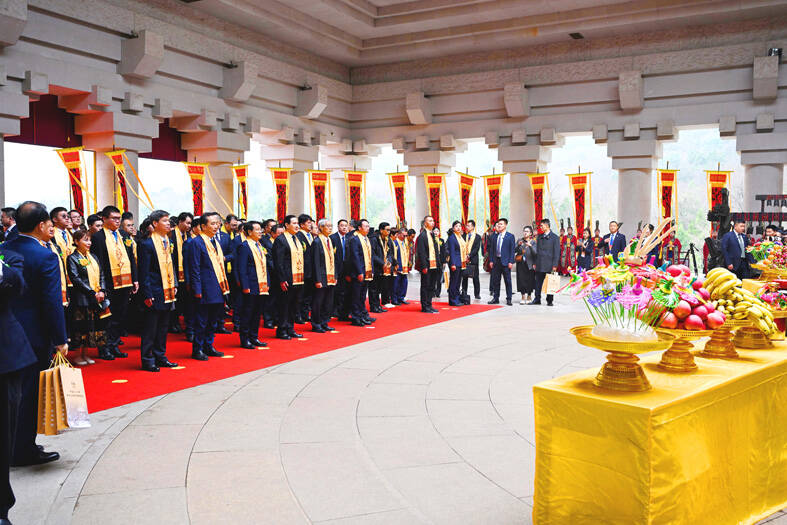Former president Ma Ying-jeou (馬英九) on Thursday expressed hope that young people in Taiwan would “keep in mind [their] Chinese cultural roots,” as he paid respects to the Yellow Emperor (Huangdi, 黃帝), who some consider to be the ancestor of Chinese people, at a ritual in China.
Ma, who is on a visit to China until Thursday next week, made the comment to reporters after taking part in the official event held in Huangling County in Shaanxi Province, where, according to legend, the emperor was buried.
He said that attending the ritual in China in person “bore significant meaning to him,” as he had paid tribute to the emperor in similar events in Taipei six times.

Photo courtesy of the Ma Ying-jeou Foundation
The majority of Taiwanese “have an extremely strong belief in Chinese culture and ethnic identity,” Ma said, adding that such belief was intact even after the Japanese empire’s 50-year colonial rule in Taiwan from 1895 to 1945.
After the colonial period, the people of Taiwan continued to recognize the Yellow Emperor as their ancestor and strived to maintain “the subjectivity and dignity of the Taiwanese,” he said.
He encouraged young Taiwanese to “firmly remember the roots of Chinese culture and the Chinese nation” and to take pride in being the descendants of the Yellow Emperor.
Thursday’s ritual was held at the Palace of Offering Sacrifices in the Mausoleum of the Yellow Emperor’s Xuanyuan Temple, as part of an annual commemorative event on Tomb Sweeping Day, which fell on Thursday this year.
He was accompanied by China’s Taiwan Affairs Office Director Song Tao (宋濤). They joined a procession of officials from the central and local governments to offer a flower basket during the ceremony, where the host referred to him as the “former chairman of the Chinese Nationalist Party (KMT).”
Ma and a group of Taiwanese students arrived in Shaanxi Province on Wednesday evening after wrapping up their visit to Guangdong Province earlier in the week.
Ma met with Huang Kunming (黃坤明), a member of the Chinese Communist Party’s politburo and the party’s secretary of Guangdong, on Wednesday, during which he urged both sides of the Taiwan Strait to “work together, pursue peace and avoid war.”
Multiple news outlets, including Reuters, have reported that Ma is to meet with Chinese President Xi Jinping (習近平) on Monday.
The KMT has been coy when asked about the matter.

SHIPS, TRAINS AND AUTOMOBILES: The ministry has announced changes to varied transportation industries taking effect soon, with a number of effects for passengers Beginning next month, the post office is canceling signature upon delivery and written inquiry services for international registered small packets in accordance with the new policy of the Universal Postal Union, the Ministry of Transportation and Communications said yesterday. The new policy does not apply to packets that are to be delivered to China, the ministry said. Senders of international registered small packets would receive a NT$10 rebate on postage if the packets are sent from Jan. 1 to March 31, it added. The ministry said that three other policies are also scheduled to take effect next month. International cruise ship operators

NUMBERS IMBALANCE: More than 4 million Taiwanese have visited China this year, while only about half a million Chinese have visited here Beijing has yet to respond to Taiwan’s requests for negotiation over matters related to the recovery of cross-strait tourism, the Tourism Administration said yesterday. Taiwan’s tourism authority issued the statement after Chinese-language daily the China Times reported yesterday that the government’s policy of banning group tours to China does not stop Taiwanese from visiting the country. As of October, more than 4.2 million had traveled to China this year, exceeding last year. Beijing estimated the number of Taiwanese tourists in China could reach 4.5 million this year. By contrast, only 500,000 Chinese tourists are expected in Taiwan, the report said. The report

The Forestry and Nature Conservation Agency yesterday launched a gift box to market honey “certified by a Formosan black bear” in appreciation of a beekeeper’s amicable interaction with a honey-thieving bear. Beekeeper Chih Ming-chen (池明鎮) in January inspected his bee farm in Hualien County’s Jhuosi Township (卓溪) and found that more than 20 beehives had been destroyed and many hives were eaten, with bear droppings and paw prints near the destroyed hives, the agency said. Chih returned to the farm to move the remaining beehives away that evening when he encountered a Formosan black bear only 20m away, the agency said. The bear

Chinese embassy staffers attempted to interrupt an award ceremony of an international tea competition in France when the organizer introduced Taiwan and displayed the Republic of China flag, a Taiwanese tea farmer said in an interview published today. Hsieh Chung-lin (謝忠霖), chief executive of Juxin Tea Factory from Taichung's Lishan (梨山) area, on Dec. 2 attended the Teas of the World International Contest held at the Peruvian embassy in Paris. Hsieh was awarded a special prize for his Huagang Snow Source Tea by the nonprofit Agency for the Valorization of Agricultural Products (AVPA). During the ceremony, two Chinese embassy staffers in attendance